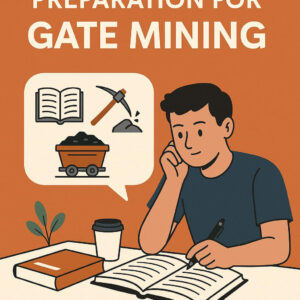Introduction: The Gateway to Excellence
The Graduate Aptitude Test in Engineering (GATE) is a prestigious examination that opens doors to postgraduate programs (M.Tech, Ph.D.) in top Indian institutes like IITs, NITs, and IISc, as well as lucrative careers in Public Sector Under.
Section 1: Decoding the GATE Exam
1.1 Exam Pattern & Syllabus
Structure: 65 questions worth 100 marks, divided into General Aptitude (15%) and Core Subjects (85%).
Question Types: MCQs, Multiple Select Questions (MSQs), and Numerical Answer Type (NAT).
Negative Marking: 1/3 for MCQs, none for MSQs/NAT.
Syllabus: Varies by discipline (e.g., Mechanical, CS, Electrical). Always refer to the official GATE 2026 brochure for updates.
1.2 Importance of Weightage Analysis
Prioritize high-weightage topics (e.g., Engineering Mathematics in CE/ME).
Use previous years’ papers (2015–2025) to identify trends.
1.3 Scoring Strategy
Focus on accuracy over attempts.
Solve NATs first (no negative marking), then MSQs, and MCQs last.
Section 2: Crafting a Personalized Study Plan
2.1 Assess Your Baseline
Take a diagnostic test to identify strengths/weaknesses.
2.2 Time Management
Students: 6–8 hours daily.
Working Professionals: 3–4 hours daily + weekends.
Sample Timetable:
Morning (2 hrs): Core subjects.
Afternoon (1 hr): General Aptitude.
Evening (2 hrs): Problemsolving.
Night (1 hr): Revision.
2.3 Phased Preparation
Phase 1 (Months 1–4): Conceptual clarity (textbooks + video lectures).
Phase 2 (Months 5–8): Topicwise practice + short notes.
Phase 3 (Months 9–12): Fulllength mocks + revision.
2.4 Adaptability
Adjust weekly goals based on mock test performance.
Section 3: Resource Curation
3.1 Books & Online Platforms
Engineering Mathematics: Higher Engineering Mathematics by B.S. Grewal.
Core Subjects:
CS: Algorithms by Cormen + NPTEL lectures.
ME: Strength of Materials by R.K. Bansal.
General Aptitude: Verbal & NonVerbal Reasoning by R.S. Aggarwal.
Online Tools: GATEIIT Bangalore for structured courses.
3.2 Digital Tools
Apps: Anki for flashcards, Forest for focus, Trello for task management.
Communities: Join Telegram groups or Reddit’s r/GATE for peer support.
Section 4: Subject-Wise Mastery
4.1 Engineering Mathematics
Master linear algebra, calculus, and probability. Solve 10 problems daily.
4.2 Core Subjects
Conceptual Depth: Use mind maps for topics like Thermodynamics (ME) or Signals & Systems (ECE).
Problem Solving: Practice 20+ numericals per topic from GATEspecific books.
4.3 General Aptitude
Verbal: Read editorials daily; use apps like Vocabulary.com.
Quantitative: Practice speed math via platforms like GATEIIT.
Section 5: Mock Tests & Analysis
5.1 Simulate Exam Conditions
Take weekly mocks (e.g., GATEIIT ).
Analyze results using SWOT (Strengths, Weaknesses, Opportunities, Threats).
5.2 Time Management
Allocate 1.5 minutes per question. Skip tough ones initially.
5.3 Error Logging
Maintain a journal for recurring mistakes and conceptual gaps.
Section 6: Revision & Retention
6.1 Active Recall
Use flashcards for formulas (e.g., Fourier transforms).
6.2 Spaced Repetition
Revise topics at increasing intervals (1 day, 3 days, 1 week).
6.3 Group Study
Join/form study groups for doubtsolving and peer teaching.
Section 7: Health & Wellness
7.1 Physical Health
Exercise: 30minute yoga or brisk walking daily.
Diet: Omega3rich foods (walnuts, fish) for brain health.
7.2 Mental Health
Meditation: Use Headspace for stress management.
Sleep: 7–8 hours nightly; avoid allnighters.
Section 8: Avoiding Common Pitfalls
Procrastination: Break tasks into 25-minute chunks (Pomodoro Technique).
Overconfidence: Regularly test basics via self-assessment.
Ignoring Updates: Check GATE 2026 notifications monthly.
Section 9: PostExam Strategy
College Applications: Shortlist institutes based on expected scores.
PSU Preparation: Research PSU criteria (e.g., ONGC, BHEL).
Conclusion: The Road Ahead
GATE 2026 demands discipline, adaptability, and resilience. By integrating structured study plans, cuttingedge resources, and selfcare, you can transform this journey into a rewarding experience. Remember, consistency is key—every hour invested brings you closer to your dream.
“Success is the sum of small efforts, repeated day in and day out.” – Robert Collier


